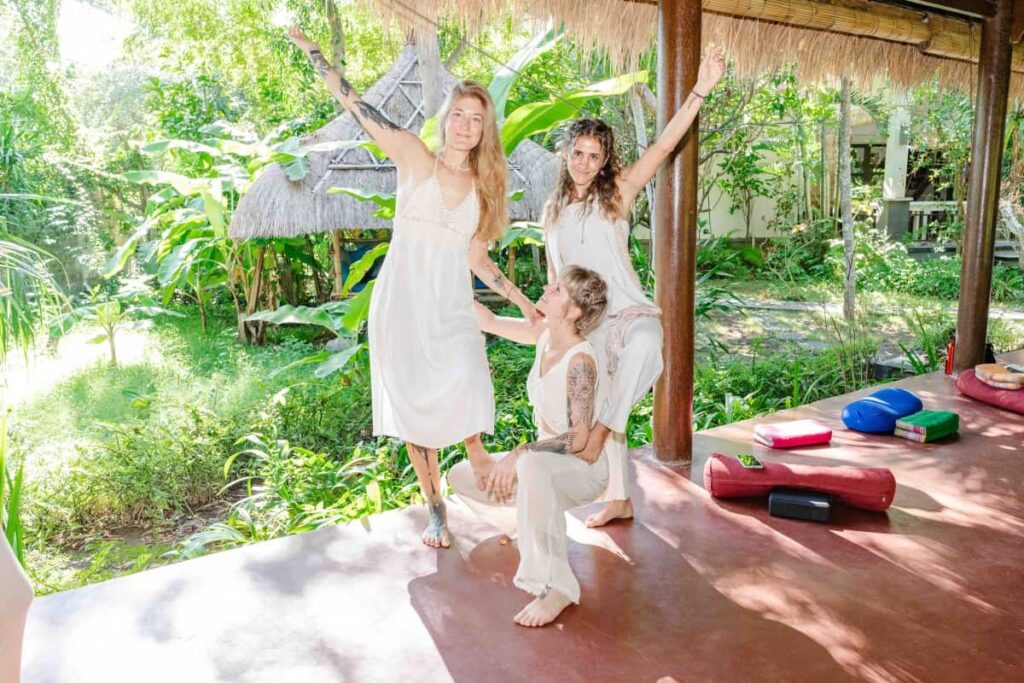Bali, often referred to as the “Island of the Gods,” has become a global yoga destination, drawing students from all over the world to experience the profound connection between spirituality, nature, and personal growth. A 200-hour yoga teacher training course (YTTC) in Bali is more than just a certification program—it’s a transformative experience that deepens your understanding of yoga and empowers you to share the practice with others.
Why Bali?
- Spiritual Ambience: Bali’s rich spiritual culture, rooted in Hindu traditions, permeates every corner of the island. The daily rituals, offerings, and serene temples create a peaceful and sacred environment, making it the perfect place for deepening your yoga practice and spiritual journey.
- Stunning Natural Backdrops: From the lush rice terraces in Ubud to the pristine beaches in Uluwatu, Bali’s breathtaking natural scenery offers a serene and inspiring environment to practice yoga. The calming energy of nature, combined with the island’s healing vibes, makes your practice even more meaningful.
- Global Yoga Hub: Bali is a hotspot for yoga and wellness enthusiasts, attracting world-class instructors and practitioners. This means you’ll be learning from highly experienced teachers while also connecting with a diverse community of like-minded individuals.
- Holistic Wellness Experience: In addition to yoga, Bali offers a wide range of holistic wellness practices, from Ayurveda and traditional Balinese healing to meditation, sound therapy, and detox programs. This creates a more comprehensive approach to your yoga journey, focusing on mind, body, and spirit.
What is a 200-Hour Yoga Teacher Training Course?
A 200-hour YTTC is a comprehensive, foundational training program that equips you with the knowledge and skills to teach yoga professionally. The course is often structured to meet Yoga Alliance standards, allowing graduates to become Registered Yoga Teachers (RYT-200) upon completion.
This course covers various aspects of yoga, including postures, anatomy, philosophy, meditation, and teaching methodology. Whether you’re looking to teach yoga or simply deepen your practice, this training provides the tools you need to progress on your path.
What to Expect in a 200-Hour YTTC in Bali
The course usually spans 3-4 weeks, depending on the program, and includes a balance of practice, theory, and hands-on teaching experience. Here’s a breakdown of the curriculum you can expect:
1. Asana (Yoga Postures)
- Alignment and Adjustments: Learn the correct alignment for key yoga postures and how to make adjustments for students of all levels.
- Multiple Styles: Experience different yoga styles such as Hatha, Vinyasa Flow, Yin Yoga, and Restorative Yoga, giving you versatility as a teacher.
- Use of Props: Learn how to incorporate yoga props (blocks, straps, bolsters) to assist students and make yoga accessible to everyone.
2. Pranayama (Breath Control)
- Master various breathing techniques that enhance physical and mental well-being.
- Learn to integrate breathwork into your classes to guide students in connecting their breath with movement.
3. Meditation and Mindfulness
- Deepen your personal meditation practice and learn how to guide others through different meditation techniques.
- Understand how mindfulness and meditation can be integrated into yoga practice and everyday life.
4. Yoga Philosophy
- Study classical yogic texts such as the Yoga Sutras of Patanjali, Bhagavad Gita, and the Eight Limbs of Yoga.
- Learn about yogic principles and ethics (Yamas and Niyamas) and how they apply to modern life and teaching.
5. Anatomy and Physiology
- Gain a deeper understanding of the human body, focusing on the musculoskeletal system and how it relates to yoga postures.
- Explore the subtle body anatomy, including chakras, nadis, and prana (life force energy).
6. Teaching Methodology
- Develop the skills needed to teach yoga classes confidently, including sequencing, cueing, and hands-on adjustments.
- Learn how to create safe, inclusive, and creative yoga classes for students of all levels.
- Practice teaching yoga to fellow students, receiving valuable feedback to refine your teaching style.
7. Practicum
- Teaching practicums are a crucial part of the course, where you’ll lead classes and receive feedback from instructors and peers.
- You’ll get hands-on experience in designing and teaching your own yoga classes, building confidence as a future instructor.
Unique Aspects of a Bali-Based Yoga Teacher Training
- Immersive Retreat Setting: Most YTTCs in Bali take place in serene retreat centers, surrounded by nature. You’ll stay in eco-friendly accommodations that emphasize sustainability and offer a peaceful environment for study and practice.
- Cultural Immersion: Bali’s rich cultural heritage is often integrated into the training experience. Many programs offer opportunities to participate in traditional Balinese ceremonies, temple visits, and local rituals, providing a deeper connection to the island’s spiritual roots.
- Holistic Wellness: Bali’s wellness scene is unparalleled. In addition to yoga, many training centers offer workshops on Ayurveda, sound healing, and detox programs, enriching your overall experience and well-being.
- Organic, Plant-Based Cuisine: Most YTTC programs provide healthy, nourishing meals that are aligned with the yogic lifestyle. Expect organic, plant-based meals designed to support your body during the intensive training process.
Benefits of Completing a 200-Hour YTTC in Bali
- Personal Transformation: The immersive nature of a 200-hour YTTC, coupled with Bali’s spiritual and healing energy, allows for deep self-reflection and transformation. Many students find that the course not only enhances their yoga practice but also encourages personal growth and self-awareness.
- Global Certification: Upon completion of the training, you will be certified to teach yoga and eligible to register with Yoga Alliance as an RYT-200. This certification is globally recognized, allowing you to teach yoga anywhere in the world.
- Community Building: You’ll be surrounded by a diverse group of students from around the world, creating a close-knit community that supports each other during and after the training. Many graduates form lifelong friendships and professional connections during their time in Bali.
- Connection to Nature: Practicing yoga in Bali’s beautiful natural surroundings offers a deeper connection to the earth and helps you cultivate mindfulness and gratitude in your practice.
How to Choose the Right Yoga School in Bali
When selecting a 200-hour YTTC in Bali, consider the following factors:
- Accreditation: Ensure the yoga school is registered with Yoga Alliance or a reputable certifying body to ensure your certification is recognized internationally.
- Instructor Experience: Research the qualifications and experience of the instructors leading the training. It’s important to learn from experienced teachers who are passionate about yoga and its deeper teachings.
- Class Size: Smaller class sizes allow for more personalized attention and a better learning experience. Check the maximum number of students allowed in the course.
- Inclusions: Verify what’s included in the course fee—accommodation, meals, excursions, and additional workshops or activities such as Balinese cultural experiences.
- Location: Consider the location of the retreat. Whether you prefer the beaches of Uluwatu or the jungles of Ubud, Bali offers diverse environments to suit different preferences.
Preparing for Your 200-Hour YTTC in Bali
- Physical Preparation: Establish a regular yoga practice in the months leading up to the training. This will prepare your body for the intensive practice schedule and help you get the most out of the course.
- Mental and Emotional Preparation: Approach the training with an open mind and a willingness to grow. A 200-hour YTTC can be physically and emotionally challenging, but the rewards are worth the effort.
- Packing Essentials: Bring your yoga mat, comfortable practice clothing, sunscreen, insect repellent, and any personal items you need to feel comfortable. Bali has a tropical climate, so pack light, breathable clothes.
Conclusion
A 200-hour yoga teacher training course in Bali is not just a certification—it’s a life-changing journey that connects you to the heart of yoga and helps you grow both as a practitioner and teacher. The combination of Bali’s natural beauty, spiritual depth, and global yoga community creates the ideal environment for self-discovery and transformation. Whether you’re looking to start a new career in yoga or simply deepen your personal practice, Bali offers the perfect setting for this profound experience.


